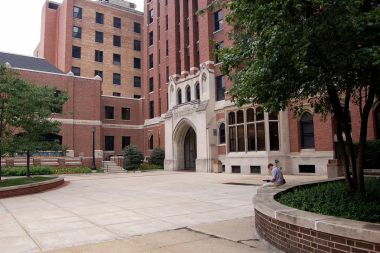Historic Bible college in 'white privilege' race row

An extraordinary row has broken out at a historic Bible college over an attack by one of its professors on an anti-racism slogan.
Bryan Litfin, who teaches theology at Chicago's Moody Bible Institute, posted on Facebook about a poster from an African-American student group, Embrace, which advertised an event featuring "thoughts on race from the perspective of a privileged white person".
Litfin wrote on his Facebook page: "Using the term 'white' to categorize millions of people under one catch-all term, then pegging them as elite oppressors, is offensive on its face and unworthy of Christian discourse."
He expanded on his comments in the college newspaper, The Moody Standard, under the heading "Rescinding the term 'white privilege'". Litfin wrote of his regret for the original Facebook post, which he said "used harsh words against a respectable student group", but argued that "white privilege" was an inappropriate term for Christian discourse. He said it implied an unbiblical corporate responsibility, stigmatised a whole group on the grounds of their face, displayed a critical spirit and can "blind us to the cry for social justice from the white oppressed" such as victims of sex trafficking, the mentally ill and homeless people. Most Caucasians he said, were not the offspring of slave owners but "merely of hard-working forefathers who did what was right".
Letters to The Moody Standard were highly critical of his stance, many of them offering personal examples of how black Americans were treated differently from whites purely on the basis of their skin colour. Fellow faculty member Clive Craigen, who teaches intercultural studies, compared race in America to a game of monopoly which began with rules "rigged" to favour certain players and only changed part way through: "Even though the discriminatory practices have ended, the historical consequences are still present," he said.
Another correspondent, Stephen Kott, said: "I don't have to consider how my race will affect me day to day. When I go shopping, I don't have to be careful because someone might think I'm shoplifting, or wonder where I got money to buy a higher-priced item. If I do something rude, I am not concerned that it will reflect negatively on my race. These are small examples, but the reality runs both deep and wide."
Moody's professor of pastoral studies, Winfred Neely, said that "one of the problems with Litfin's rationale expressed in his letter is the implicit and glaring misunderstanding of the nature of white privilege". She argued that white privilege was "one of the vestiges of slavery" in the US, concluding that Litfin "says in essence, 'I will tell you how to express yourself about the topic.' His posture is arrogant and an ironic example of the voice of white privilege."











